English Vocabulary for Weddings (Illustrated)
Going to a wedding is always fun, no matter what language you speak. Who doesn't love getting together with friends and family, attending a beautiful ceremony and going to an amazing party afterwards? Despite this, for students of English, going to a wedding where English will be the main language might also be a little stressful. That's why we put together this list of English wedding words.
In this lesson, you will learn all the vocabulary you need to be a guest at a wedding where English is spoken. After the lesson, you will also be able to tell your friends all about the experience.
This lesson is part of the Vocabulary Lessons series. Let's get started!
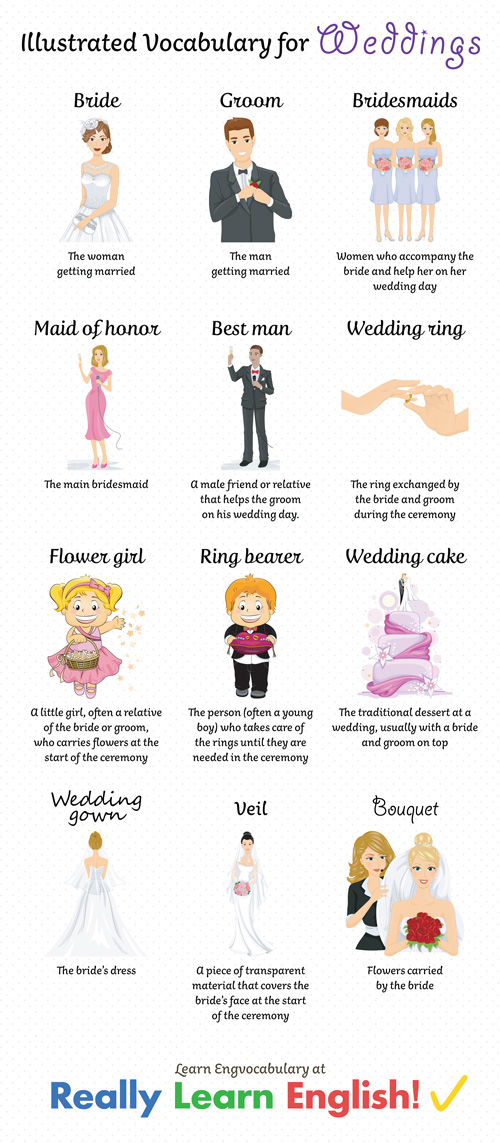
Click Here for Step-by-Step Rules, Stories and Exercises to Practice All English Tenses
In this lesson, we will cover these topics:
- The Wedding Party (the people who participate in the wedding)
- Wedding Attire (clothing)
- The Ceremony
- The Reception
- Other Wedding Vocabulary and Expressions
The Wedding Party
The term wedding party is a little bit misleading. It doesn't refer to the celebration after the wedding – that's called the reception – but instead refers to the people who participate in the wedding. Let's take a look at who the members of the wedding party are.
Bride (noun)
The woman getting married
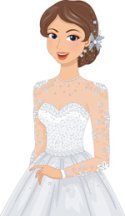
Groom (noun)
The man getting married

Bridesmaid (noun)
A woman, usually a close friend or relative of the bride, who accompanies the bride and helps her on her wedding day. It is typical for a bride to have 3-5 bridesmaids.
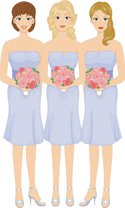
Maid of honor (noun)
The main bridesmaid. If she is married, she is referred to as the matron of honor.

Best man (noun)
A male friend or relative that helps the groom on his wedding day.

Bride's parents (noun)
The bride's parents are referred to as the mother of the bride and the father of the bride.

Groom's parents (noun)
The groom's parents are referred to as the mother of the groom and the father of the groom.
Flower girl (noun)
A little girl, often a relative of the bride or groom, who carries flowers at the start of the ceremony.
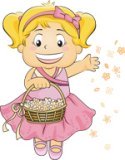
Ring bearer (noun)
The person who takes care of the rings until they are needed in the ceremony. Often a young boy who is a relative of the bride or groom.

Other important people at the wedding are:
Guests (noun)
The people who attend the wedding
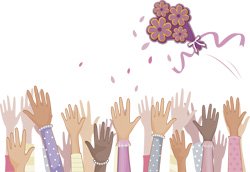
Officiator (noun)
The person who performs the ceremony and officially marries the bride and groom
Photographer (noun)
Someone hired by the bride and groom to take pictures

Wedding planner (noun)
Someone hired to plan the wedding and who takes care of logistical details on the big day

Witness (noun)
Someone who observes the ceremony and signs the marriage certificate
Usher (noun)
The person who takes care of seating the guests before the ceremony
Wedding Attire
Attire mean clothing.
One of the best parts of a wedding is dressing up in fancy clothes and admiring the clothes worn by the bride and other members of the wedding party. Let's take a look at some vocabulary for clothing.
Bridesmaid's dress (noun)
It is traditional for bridesmaids to wear matching dresses

Bouquet (noun)
Flowers carried by the bride

Engagement ring (noun)
The ring given to the bride when the groom first asks to marry her

Lace (noun)
Cotton or silk that has been woven into a special pattern. Often used to decorate the bride's dress

Sequins (noun)
Sparkly disks often used to decorate the bride's dress

Suit (noun)
A combination of jacket and trousers worn on formal occasions. At a wedding, typically worn by the groom

Train (noun)
A long piece of fabric at the back of the bride's dress that trails along the ground

Tuxedo (noun)
A black suit worn by men at very formal occasions

Wedding gown (noun)
A more formal word for the bride's dress

Wedding ring (noun)
The ring exchanged by the bride and groom during the ceremony. Sometimes called a wedding band

Veil (noun)
A piece of transparent material that covers the bride's face at the start of the ceremony

The Ceremony
The two most common wedding ceremonies in English-speaking countries are civil ceremonies and traditional white weddings. Civil ceremonies are not religious and are held at a marriage bureau, a government office that has the authority to conduct weddings. Marriage bureaus are also called registry offices.
A traditional white wedding can be held in a church, synagogue, temple, or other religious places. Some couples prefer to get married outside and have the ceremony in a beautiful natural location such as a park or garden. White weddings have this name because the bride usually wears a white dress at these ceremonies. Let's look at some other vocabulary for the ceremony.
Aisle (noun)
The passage in the middle of a church or temple. It is traditional for the bride to walk down the aisle with her father or another close relative.
Confetti (noun)
Small pieces of paper thrown by the guests after the ceremony for good luck. Sometimes rice is thrown instead of confetti.

To exchange vows (verb)
The bride and groom each make a speech where they speak about their feelings for each other. When they do so, they are said to be exchanging vows.
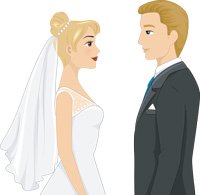
To say "I do" (verb)
When the officiator asks the couple if they are ready to accept the responsibilities of marriage, it is traditional for the bride and groom to say, "I do."
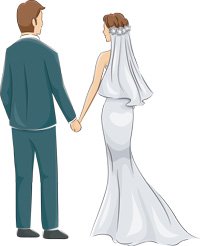
To swear (verb)
To promise. Often the officiator will ask the couple if they swear to protect one another.
Wedding bells (noun)
At a white wedding, after the ceremony bells will ring. This is a sign that the couple is officially married.
Other expressions you may hear at a wedding are:
Please rise. (Please stand up, because the ceremony is about to begin.)
Do you take this man to be your lawfully wedded husband? and Do you take this woman to be your lawfully wedded wife? (Are you ready to accept the responsibilities of marriage?)
You may now kiss the bride. (The most romantic part of the ceremony.)

I now pronounce you husband and wife. (Pronounce here means "officially announce.") This marks the end of the ceremony and is usually met with applause.)
The Reception
After the ceremony, it is traditional to celebrate the marriage with a party (called "the reception"). Wedding receptions usually involve a special meal followed by speeches, music and dancing. Useful words for the reception are:
Band or live band (noun)
A group of musicians hired to play music
Buffet (noun)
A meal where guests serve themselves
Champagne (noun)
It is traditional to celebrate with this fizzy drink

Dance floor (noun)
The place where dancing takes place
DJ (noun)
If there isn't a band, there will probably be a DJ. Sometimes the DJ will take requests, meaning that you can ask for songs that you would like to hear.
First dance (noun)
The first dance is another very romantic party of the wedding. This is the first time the couple dances together as husband and wife.

Hors d'oeuvres (noun)
Light snacks, typically eaten before the meal
To make a speech (verb)
It is traditional for members of the wedding party to say a few words about the bride and groom. Usually the best man, the maid of honor and the groom make speeches.
Reception venue (noun)
The place where the party is held
Sit down meal (noun)
At formal weddings, guests will be seated by name at tables and waiters and waitresses will bring them their food.

To toast or to make a toast (verb)
To clink glasses in celebration of the couple.

To throw the bouquet (verb)
It is traditional for the bride to throw the bouquet over her shoulder. The person who catches the bouquet is said to be the next person to get married.
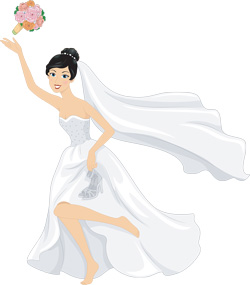
Wedding cake (verb)
The traditional dessert at a wedding. Usually the wedding cake has miniature figurines of the bride and groom on top.

Other Wedding Vocabulary and Expressions
Here is some other vocabulary you might need at the wedding!
Wedding invitation (noun)
The invitation the bride and groom send out inviting people to their wedding

Bachelor party (noun)
A party for the groom and his friends. Usually takes place a few weeks or months before the wedding. In Britain, this party is called a stag party or a stag do.
Bachelorette party (noun)
A party for the bride and her friends. Usually takes place a few weeks or months before the wedding. In Britain, this party is called a hen party or a hen do.
Bridal shower (noun)
A party for the bride and her family and friends. At the bridal shower it is traditional to give gifts. Usually the bridal shower is more relaxed than the bachelorette party.

To propose (verb)
To ask someone if they would like to marry you. Other expressions that describe this are to get down on one knee and to pop the question.
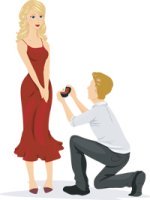
To elope (verb)
To get married in secret, without telling anyone
Engaged (adjective)
A man or a woman who is going to get married
Fiancé (noun)
After he proposes, but before he is married, the groom is referred to as the fiancé.
Fiancée (noun)
Before the wedding, the bride is referred to as the fiancée. (Pronounced the same as fiancé.)
Honeymoon (noun)
A special trip taken by the bride and groom after the wedding. The verb is to go on honeymoon.

Newlyweds (noun)
Refers to a couple that has just gotten married

Wedding gift (noun)
The present you give to the bride and groom
Get Updates, Special Offers, and English Resources
Download your FREE GIFT (the first two chapters of
English Short Stories Book and Workbook)
as soon as you join!

By submitting your email, you consent to receiving updates and newsletters from us and to the sharing of your personal data with third parties for the purposes of sending you communications. We will not spam you. You can unsubscribe at any time. For more information, please see our privacy policy.
Return from English Vocabulary for Weddings (Illustrated) to English Vocabulary Word Lists (Illustrated)





